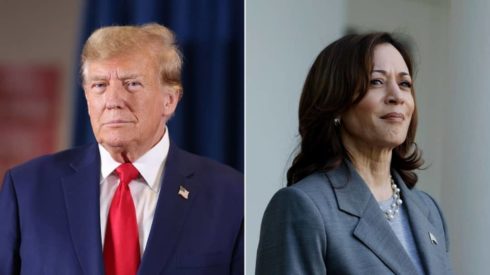After weeks of intense negotiations, the much-anticipated presidential debate between Donald Trump and Kamala Harris is officially set, with rules finally agreed upon following a heated dispute over microphone usage. The event, hosted by ABC News, is scheduled for Tuesday, September 10, at the National Constitution Center in Philadelphia. This 90-minute debate will mark the first and possibly the only time these two high-profile candidates face off before Election Day.
The debate will be a significant milestone in the 2024 presidential race, with both candidates feeling the pressure to perform, as voters in some states will soon begin casting their ballots. In an attempt to keep the debate focused and civil, ABC News has released a series of guidelines that both campaigns have now agreed to, including strict microphone regulations.
Microphone Dispute Settled
One of the most contentious issues leading up to the debate was over how microphones would be handled. ABC News revealed that only the candidate speaking will have their microphone live, with the other candidate’s mic muted during that time. This is the same rule that was applied during Trump’s earlier debate with Joe Biden in June, which had led to considerable controversy.
The Kamala Harris campaign initially pushed back against the muted microphone rule, claiming it unfairly benefited Donald Trump. Kamala Harris’s team argued that muting microphones could allow Trump to dodge tough questions and limit Harris’s ability to directly engage with her opponent. On the other hand, the Donald Trump campaign accused Harris of trying to evade the debate altogether. In the end, both sides agreed to stick with the established rules, ensuring that the debate will proceed with microphones muted during non-speaking times, which could influence the tone and flow of the discussion.
Debate Format and Moderator Roles in Donald Trump and Kamala Harris Presidential Debate
ABC News anchors David Muir and Linsey Davis will moderate the event, asking all the questions and keeping the debate on track. There will be no opening statements from either candidate, but both will be allowed two minutes each for closing remarks, with the order determined by a coin toss. Trump won the toss and chose to give the second closing statement, while Harris will go first.
Candidates will also be stationed at podiums for the entire duration of the debate. Notably, Kamala Harris selected the right podium, leaving Donald Trump positioned on the left. The structure of the debate will limit interruptions and give each candidate two minutes to answer questions, with an additional two minutes for rebuttals. An extra minute will be available for follow-ups and clarifications, but neither candidate will be allowed to ask the other direct questions.
High Stakes for Both Candidates
With the debate happening less than 60 days before Election Day, the stakes couldn’t be higher for both candidates. For Donald Trump, this is a critical moment to solidify his support and sway undecided voters, while Kamala Harris needs to deliver a strong performance to convince the electorate that she is ready to lead.
The pressure is heightened by the fact that some voters will already be able to cast their ballots in the days following the debate, making this face-off potentially pivotal. Both candidates are vying to control the narrative, and any missteps could have significant consequences. As there will be no audience present, the debate will allow the candidates to focus entirely on the issues without the influence of crowd reactions.
Historical Context and Future Implications
This debate is not only significant for its content but also for its historical context. The rules regarding muted microphones hark back to the Trump-Biden debate, where Biden’s team initially called for microphones to be cut off when it wasn’t a candidate’s turn. Ironically, Biden’s inability to engage directly during that debate hurt his campaign, leading to growing calls from within his party to step down. Ultimately, Biden exited the race shortly after the debate, opening the door for Harris to take the Democratic nomination.
As Donald Trump and Kamala Harris prepare for their showdown, both campaigns are aware of the historical weight of this event. For the moderators, enforcing the rules, particularly on timing and microphone control, will be crucial to ensuring a smooth and fair debate. With no audience and two commercial breaks, this tightly controlled environment could become a defining moment in the 2024 election. The eyes of the nation will be on Philadelphia, waiting to see which candidate emerges stronger from this must-see political event.














